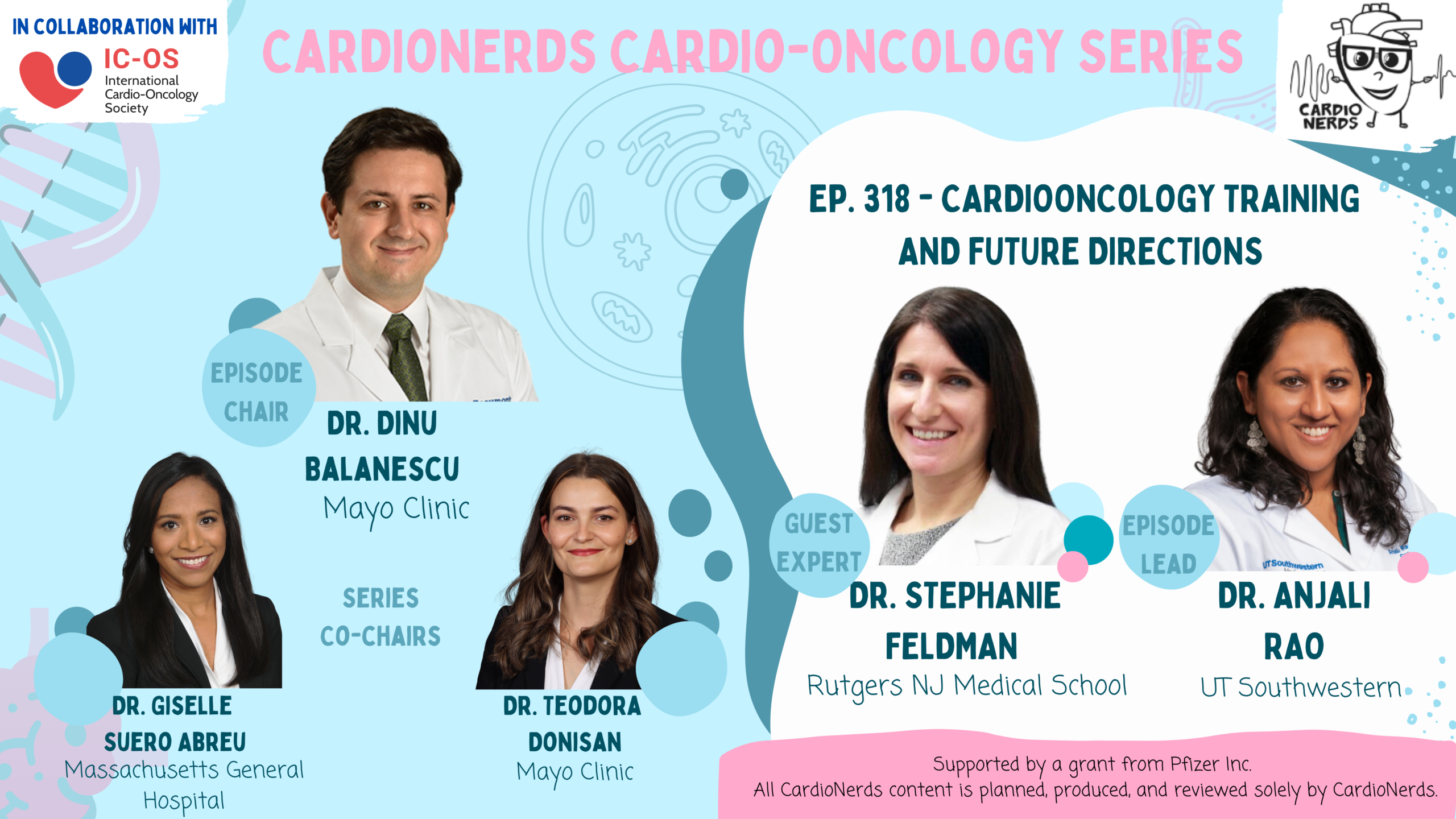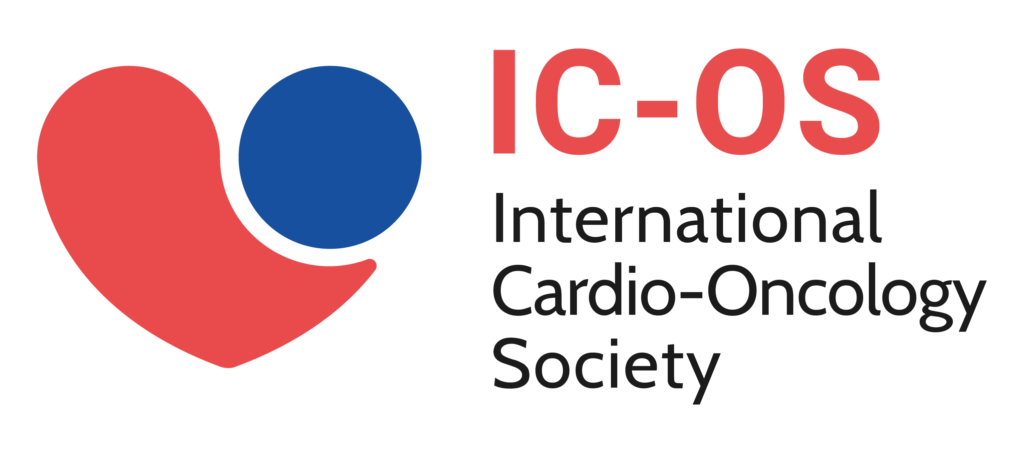Cardionerds: A Cardiology Podcast

318. Cardio-Oncology: Training and Future Directions with Dr. Stephanie Feldman
CardioNerds cofounder Dr. Daniel Ambinder, series co-chair Dr. Dinu Balanescu (FIT, Mayo Clinic), and episode lead Dr. Anjali Rao (FIT, UTSW) discuss training in cardio-oncology with Dr. Stephanie Feldman from Rutgers University. In this episode, the group discusses some of the most burning questions about educating the next wave of cardio-oncologists. As Dr. Feldman mentions, the projected number of cancer survivors is predicted to be around 24 million by 2024, underscoring the growing importance of cardio-oncology in our practice. We highlight some of the challenges facing trainees and training programs alike, including how to integrate cardio-oncology education into general cardiology training, the optimal structure for an advanced cardio-oncology fellowship, and the role of cardio-oncology in the inpatient setting. We also talk about the takeaways from the ACC Cardio-Oncology Leadership Council document. Dr. Feldman reflects on the importance of flexibility in education in the current landscape, drawing on her personal experience as a cardio-oncologist during the COVID-19 era. Notes were drafted by Dr. Anjali Rao. Audio editing was performed by student doctor, Shivani Reddy.
This episode is supported by a grant from Pfizer Inc.
This CardioNerds Cardio-Oncology series is a multi-institutional collaboration made possible by contributions of stellar fellow leads and expert faculty from several programs, led by series co-chairs, Dr. Giselle Suero Abreu, Dr. Dinu Balanescu, and Dr. Teodora Donisan.
Pearls • Notes • References • Production Team

CardioNerds Cardio-Oncology Page
CardioNerds Episode Page
CardioNerds Academy
Cardionerds Healy Honor Roll
CardioNerds Journal Club
Subscribe to The Heartbeat Newsletter!
Check out CardioNerds SWAG!
Become a CardioNerds Patron!
Pearls and Quotes – Cardio-Oncology: Training and Future Directions
- It may be possible to achieve “COCATS level 2” cardio-oncology training during general cardiology fellowship. A dedicated cardio-oncology year may appeal to trainees who want to achieve “COCATS level 3”, i.e., dedicate their practice to caring for patients with complex cardio-oncology needs, become involved in clinical trials, and lead cardio-oncology clinical and training programs.
- Supplemental learning opportunities for general fellows can include:
- Rotating in a cardio-oncology clinic, ideally attached to a National Cancer Institute-designated cancer center
- Multi-modality cardiac imaging
- Participating in cardio-oncology research
- Rotating in a cardio-oncology clinic, ideally attached to a National Cancer Institute-designated cancer center
- Some currently available educational opportunities include:
- The International Cardio-Oncology Society (ICOS) weekly webinars
- The American Society of Echocardiography (ASE) webinars on global longitudinal strain
- The American Society of Nuclear Cardiology lecture series on cardiac amyloidosis
- Cardio-oncology focused conferences, such as the American College of Cardiology’s (ACC) Advancing the Cardiovascular Care of the Oncology Patient and Memorial Sloan Kettering’s Cardio-Oncology Symposium.
- The International Cardio-Oncology Society (ICOS) weekly webinars
- Each institution may have different inpatient cardio-oncology needs depending on whether there is a stand-alone cancer hospital or another format. Examples of inpatient consults that may benefit from having a cardio-oncologist involved include:
- Cardiovascular risk assessment prior to bone marrow transplant or cancer related surgery in a patient with known coronary artery disease
- Immune checkpoint inhibitor myocarditis
- Chemotherapy-related cardiac dysfunction
- Management of systemic anticoagulation in a patient with high CHA2DS2-VASc and chemotherapy related thrombocytopenia.
- Cardiovascular risk assessment prior to bone marrow transplant or cancer related surgery in a patient with known coronary artery disease
Show notes – Cardio-Oncology: Training and Future Directions
The need for cardio-oncology experience is undeniable given the growing population of patients with cancer and cardiovascular disease, particularly given the number of anti-neoplastic therapies with potential cardiovascular side effects. There are several strategies for incorporating cardio-oncology experiences into general cardiology training. These may include rotating through a cardio-oncology clinic, enhanced exposure to multimodality cardiac imaging including global longitudinal strain and participating in cardio-oncology research.
The need for dedicated formal training in cardio-oncology is more nuanced. If the goals of a formal fellowship align with a trainee’s career goals, an additional year of training can provide advanced exposure to complex medical decision-making, cardio-oncology specific imaging training (i.e., global longitudinal strain, MRI, PET), and even inpatient cardio-oncology experience at several centers. Prospective cardio-oncology trainees should gain clinical exposure during general cardiology fellowship and research exposure where available, and these experiences can factor into their decision to pursue a cardio-oncology fellowship.
Additional resources from national societies (e.g., ICOS, ACC, ASE) for cardio-oncology education can be made available to general cardiology trainees to expand their knowledge base. In some institutions, inpatient cardio-oncology consults may be appropriate. As a general rule, consultations regarding chemo- or immunotherapy-related cardiotoxicities or pre-stem cell transplant risk stratification may benefit from involvement of cardio-oncology in some form.
The future of cardio-oncology is bright, especially with the development of programs to train the next generation of cardio-oncologists!
References – Cardio-Oncology: Training and Future Directions
- Tuzovic M, Brown SA, Yang EH, et al. Implementation of Cardio-Oncology Training for Cardiology Fellows. JACC CardioOncol. 2020;2(5):795-799. Published 2020 Dec 15. · CardioOncology Education and Training.
- Alvarez-Cardona JA, Ray J, Carver J, et al. Cardio-Oncology Education and Training: JACC Council Perspectives. J Am Coll Cardiol. 2020;76(19):2267-2281.
- Cardio-oncology Training in the COVID-19 Era. Feldman S, Liu J, Steingart R, Gupta D. Cardio-oncology Training in the COVID-19 Era. Curr Treat Options Oncol. 2021;22(7):58. Published 2021 Jun 7.
Meet Our Collaborators
International Cardio-Oncology Society ( IC-OS). IC-OS exits to advance cardiovascular care of cancer patients and survivors by promoting collaboration among researchers, educators and clinicians around the world. Learn more at https://ic-os.org/.







 Visit Podcast Website
Visit Podcast Website RSS Podcast Feed
RSS Podcast Feed Subscribe
Subscribe
 Add to MyCast
Add to MyCast